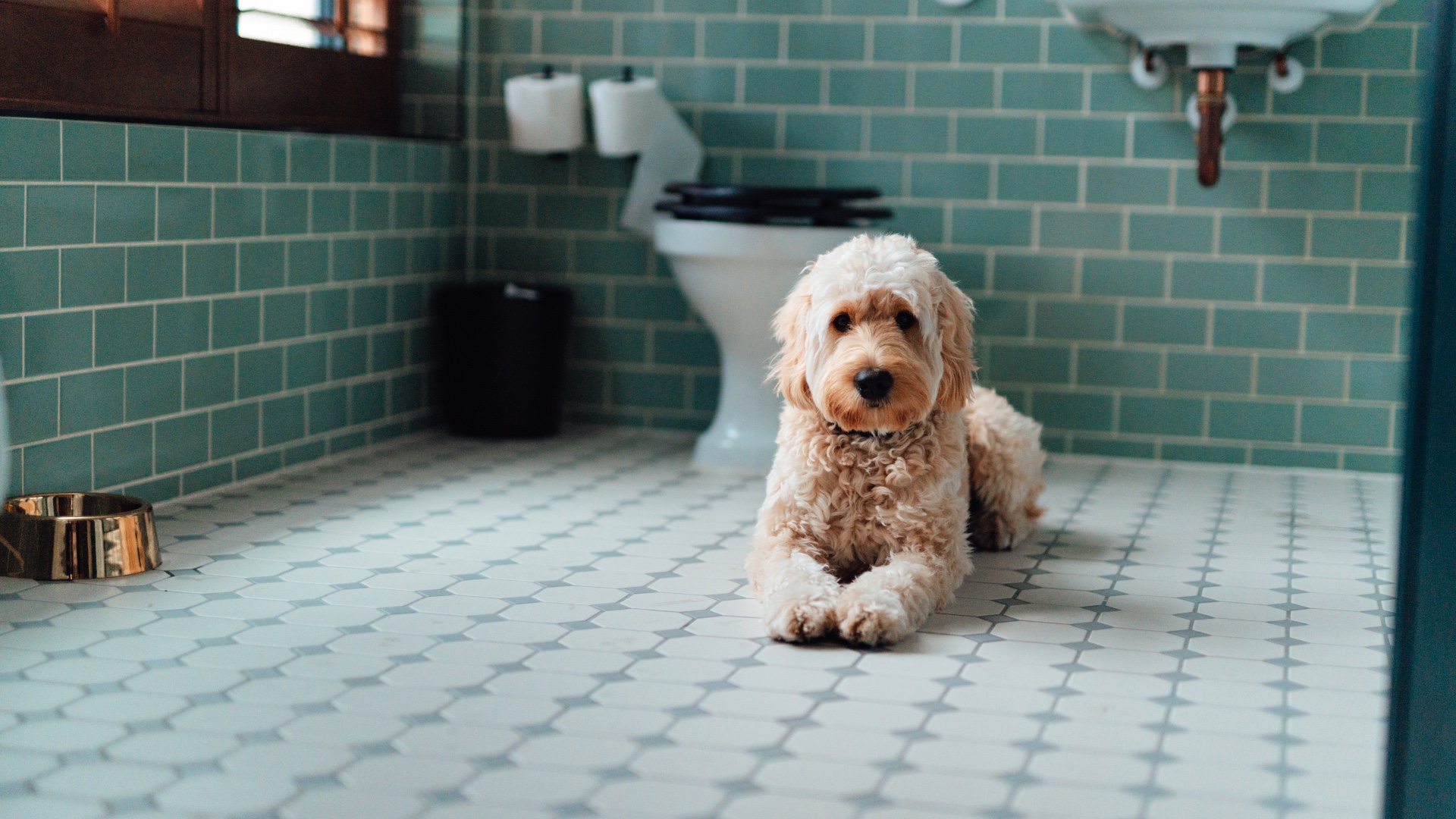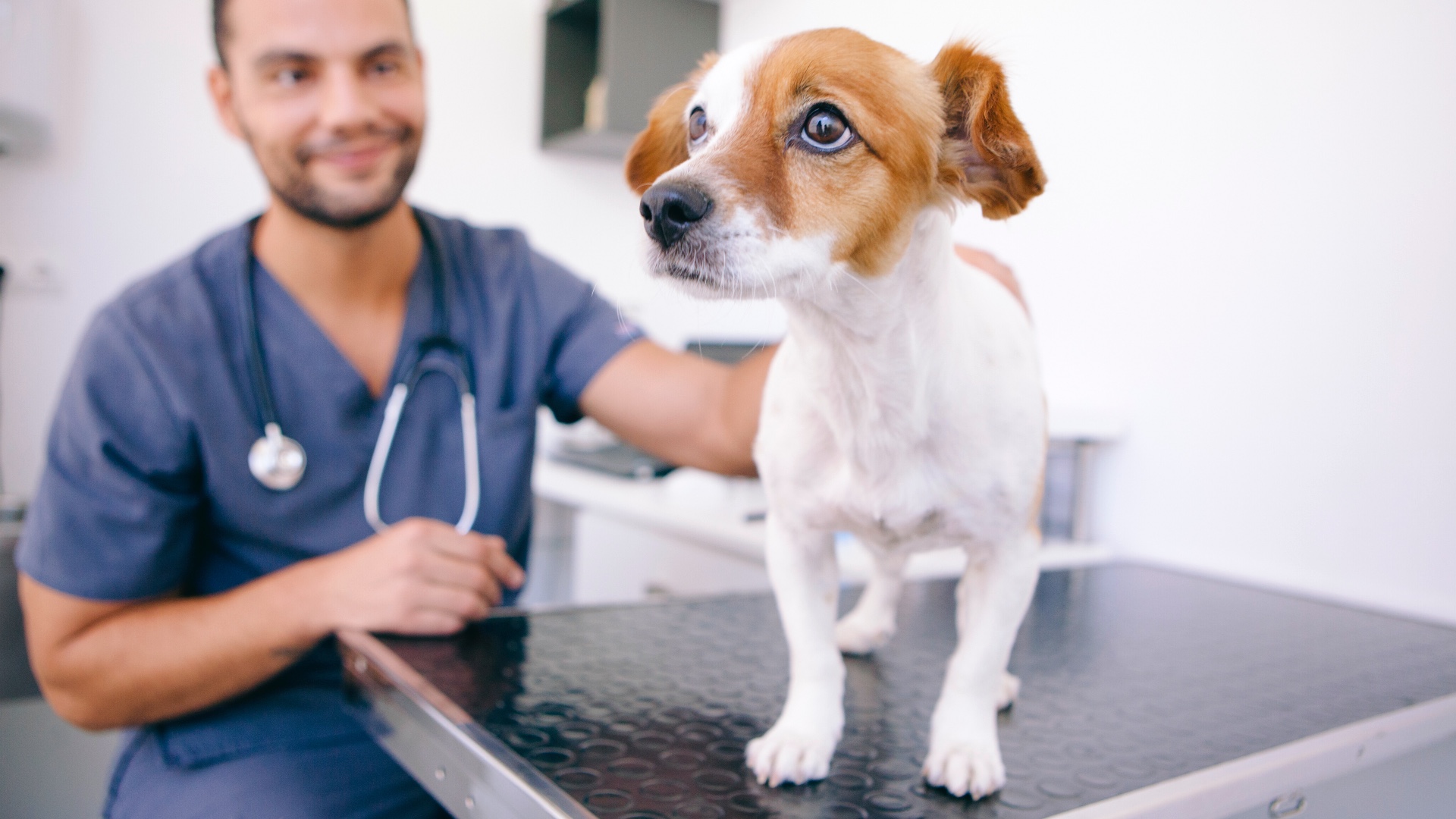Diarrhea in dogs: What gives dogs diarrhea and when to call the vet
Some cases of diarrhea in dogs are more serious than others. We talk you through the possible causes and when it's time to seek professional help for your pooch

At some point, every pet parent deals with a dreaded case of diarrhea in dogs. While there are many causes of doggy diarrhea, some are more serious than others. Diarrhea can be transient and may resolve on its own. However, some cases of diarrhea may need treatment by a vet. This article will discuss the many causes of diarrhea and help you determine when to seek professional care.
- Dog losing weight: A vet's guide to causes and treatment
- Dog throwing up yellow foam: A vet's guide to causes and treatment
- Is my dog sick? Ten signs you need to take your dog to the vet
What is diarrhea in dogs?
Dog diarrhea is any unformed or loose fecal material. During the digestive process, the water in digestive contents is absorbed and formed into firm fecal material. When there is digestive upset, this process can be disturbed. This disruption can result in less water being absorbed and your dog’s stool appearing watery or soft. Dogs experiencing diarrhea often struggle to control their bowel movements. Because of this, your dog may experience a more frequent need to use the bathroom.
What gives dogs diarrhea?
There are many causes of dog diarrhea. Below are some of the most common...
Bacteria
Dogs frequently encounter bacteria in the environment. However, some bacteria can cause digestive upset. Bacteria such as Salmonella, Campylobacter, Clostridium, and Listeria are commonly associated with diarrhea. These bacteria can be found in the environment, water bowls, and food. They are of particular concern in raw food diets.
Diarrhea caused by bacteria can be treated with antibiotics prescribed by your vet. Always take precautions and use proper sanitation when cleaning up after your dog. Many of the bacteria that cause diarrhea in dogs can have the same effect on you.
Viruses


There’s no NHS for pets. Veterinary care can be eye-wateringly expensive and most pets will need treatment for an illness or injury at some point in their life. It’s difficult to think about your animals being hurt or unwell, but you need to ask yourself: what would you do if you were faced with a vet bill for hundreds or thousands of pounds?
Viruses that commonly cause diarrhea include parvovirus, distemper virus, and coronavirus. It is important to note that this coronavirus is different from the strain of virus that causes COVID-19 in humans. Dogs are routinely vaccinated for parvovirus and distemper. These two conditions are more common in younger dogs who have not completed their initial vaccine series. A coronavirus vaccine is available for dogs but is not a part of the standard vaccine recommendations.
Treatment of viruses involves keeping dogs hydrated and providing supportive care. Viruses can be life-threatening in young dogs, and appropriate veterinary care is essential.
Intestinal parasites
Dogs can get intestinal parasites from contaminated soil, water, food, or other infected dogs. Intestinal parasites in dogs include coccidia, giardia, roundworms, hookworms, and whipworms. Young dogs and dogs with compromised immune systems are most susceptible to parasites. Diarrhea is the most common symptom, but chronic infection can lead to weight loss.
Vets can diagnose intestinal parasites by examining your dog’s poop. Once the parasite is identified, your vet will prescribe an appropriate treatment. Some diarrhea-causing parasites can be transmitted to humans, so it is essential to use caution when picking up after your dog.
Change in diet
Sudden changes to the diet is a common cause of diarrhea in dogs. When switching to a new food, it is essential to switch your dog over gradually. Start by incorporating small amounts of the new food with their regular diet. As long as your pet tolerates the new food, continue to increase the new food ratio every day. The transition to the new food should be done over 1-2 weeks.
Food intolerances and food allergies
Some dogs may experience diarrhea due to food intolerance or food allergies, even with gradual introductions of new food. These are usually triggered by a protein source that causes an inflammatory reaction in your dog’s digestive tract. These digestive issues can be chronic until the ingredient causing the problem is removed from your dog’s diet. Dogs who experience food allergies may also develop skin breakouts, as well as increased itch.
Consumption of inappropriate food or material
If your dog has recently broken into the garbage or gotten ahold of table scraps, this could be the cause of their diarrhea. Likewise, if they have eaten part of a stuffed toy or other foreign objects, this may be causing digestive issues. It may take a while for the foreign material to pass through their system. However, in some cases, medical intervention may be necessary.
Stress
Just as stress can cause your stomach to get upset, stress can do the same thing to dogs. Any changes to routine or environment can lead to stress-related diarrhea. In some cases, dogs can feed off your stress and experience digestive issues.
When to call the vet

Diarrhea can be a serious issue, and it is essential to seek veterinary care for ongoing symptoms. If your dog has had persistent diarrhea for 48 hours, schedule an appointment with your vet.
However, if your dog is experiencing other symptoms, a more urgent visit may be necessary. Additional symptoms of concern include vomiting, extreme lethargy, or any signs of blood in the diarrhea. Dogs with known health conditions should be monitored closely. If your dog has a known health condition and experiences more than one episode of diarrhea, do not wait to contact your vet.
When taking your pet to the vet, bringing a stool sample can be quite helpful. Your vetcan use this sample to run tests for parasites and other potential causes of diarrhea. If the diarrhea is too difficult to pick up due to the liquid, try taking a picture of the stool. The consistency and color can help your vet narrow down the potential causes.
Diarrhea: Not always as innocuous as it seems
With the many causes of diarrhea, determining what is happening with your dog can seem overwhelming. A single episode of diarrhea may not be a serious concern. However, you should be aware that some causes of diarrhea can pose a serious health risk for your pet. Call your vet if your dog is experiencing other symptoms or the diarrhea has not resolved within 48 hours. Your vet can perform tests to help determine what is causing your dog’s digestive issues and develop a treatment plan. Diarrhea can be a frustrating and confusing issue. Understanding the causes and knowing what to do will help you get your pet the care they need.
You may also be interested in learning about why your dog’s stomach is gurgling
PetsRadar Newsletter
Get the best advice, tips and top tech for your beloved Pets
Dr. Elizabeth Racine is a small animal general practice vet covering all things pet health and wellness. Her special interests include veterinary behavior, nutrition, and internal medicine.
As a freelance writer, Dr. Racine has written content for major companies in the industry such as the American Kennel Club, Merck Animal Health, Bayer PetBasics, Elanco, and CareCredit. In her free time, Dr. Racine enjoys playing trampoline dodgeball, hiking with her beagle Dasher, and spending time with her three mischievous cats.

